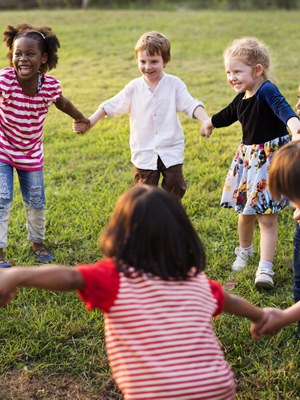 Our Preschool Program
Our Preschool ProgramA good preschool can make a difference in a child's future school years. We offer individual programs for children to help them learn in an environment that is stress free and fun. Some learning centers our preschoolers explore are music, science, math, language arts and manipulative play.
Our preschoolers curriculum includes:
? What is the ratio?
The ratio for our 3-4 year old children is 12:1. The maximum group size is 16 compared to minimum standards group size of 22. Typically there is one designated teacher for each room with a second teacher that floats between 2 rooms to assist when needed and during the busiest moments of the day.
? What does the school provide?
We provide almost everything your child needs for the day such as meals, cots, toys and materials, meals and snacks, and love and support. Typically all you need to bring is extra clothes, mosquito repellant, and sunscreen.
? How do I know what my child is doing throughout the day?
Building Blocks uses a parent app. The teachers will post meals, diaper changes or toileting progress, activities, photos and more. Parents can also message teachers directly.
? Does my child need to be potty-trained?
We do not require that your child be potty-trained to enroll in the Preschool program. However, this is an important milestone and as soon as children show signs of readiness, we will provide the support and encouragement needed to complete this stage of development. Children are provided diapers through Building Blocks Diaper Club. We do not supply pull-ups.
? What if my child doesn’t nap?
Children are not required to nap. We ask that they observe a quiet period after lunch so that those who need to sleep are able. Then children who do not nap are offered an alternative quiet activity.
? Why Building Blocks instead of Head Start or Public Pre-K?
Building Blocks has flexible hours, more open days of the year, and small class sizes while we also have state approved curriculum and participate in the Texas School Ready program. We would be happy to provide more details about our program! This is a very personal decision and we will be supportive of the family and child either way!
? Do you pick up from Head Start or Public Pre-K?
We would consider pick up from any school in WFISD if there are at least 2 children and the school fits into our pick-up schedule to be considered on a case by case basis.
? How do you ensure safety on field trips?
? Will my child be able to read before Kindergarten?
Our focus in not on teaching children to read before they are ready. We do however give your child the building blocks to read. The curriculum includes plenty of activities that address reading readiness, phonological awareness, letter knowledge, reading comprehension, and print concepts.
? How will my child learn to write?
Did you know that learning to write literally starts from the time children are born? The skills needed for writing start from the core of the body and move to the outer extremities of the the hands and fingers. So they are learning to write from the time of holding up the head and rolling from back to stomach, etc. At this age, we provide plenty of gross motor and fine motor skills, all important to writing. Fine motor activities are included to build hand strength and flexibility. These activities include bead stringing, tracing letters in sand, forming letters
using play dough, use tweezers and tongs in sorting activities. The morning message covers written letters, capitalization, and punctuation.
? What does a typical day look like?
We have a very consistent routine. After breakfast we have greeting, brain smart start and morning message. After greeting time, we go
outside and play, then have snack, large group (we move our bodies during this
time and also learn how to cooperate as a group), then we have more play, lunch, nap,
and outside time.
? Are children taught manners?
Children learn manners through teacher modeling, stories, songs, and daily rituals.
? How do you handle discipline?
Teachers start Conscious Discipline training during orientation and continue throughout their career with Building Blocks. We are trained to use these guidance techniques to create a positive atmosphere where children can learn to recognize their emotions, be able to calm themselves with support and to stand up to aggressive behavior among other things. Teachers and children use "oops" moments as opportunities to problem solve.
? What are some signs of Kindergarten Readiness?
? What can I do at home to support my child and the class?
1. Devote at least 10 minutes of time to spend with your child everyday. Studies show that just 10 minutes of time devoted to your child makes an important difference in your child's well-being. Being a parent is hard. Being a working parent is harder so spend as much time as you can on the days that you have the time. On days that time is limited, just take 10!